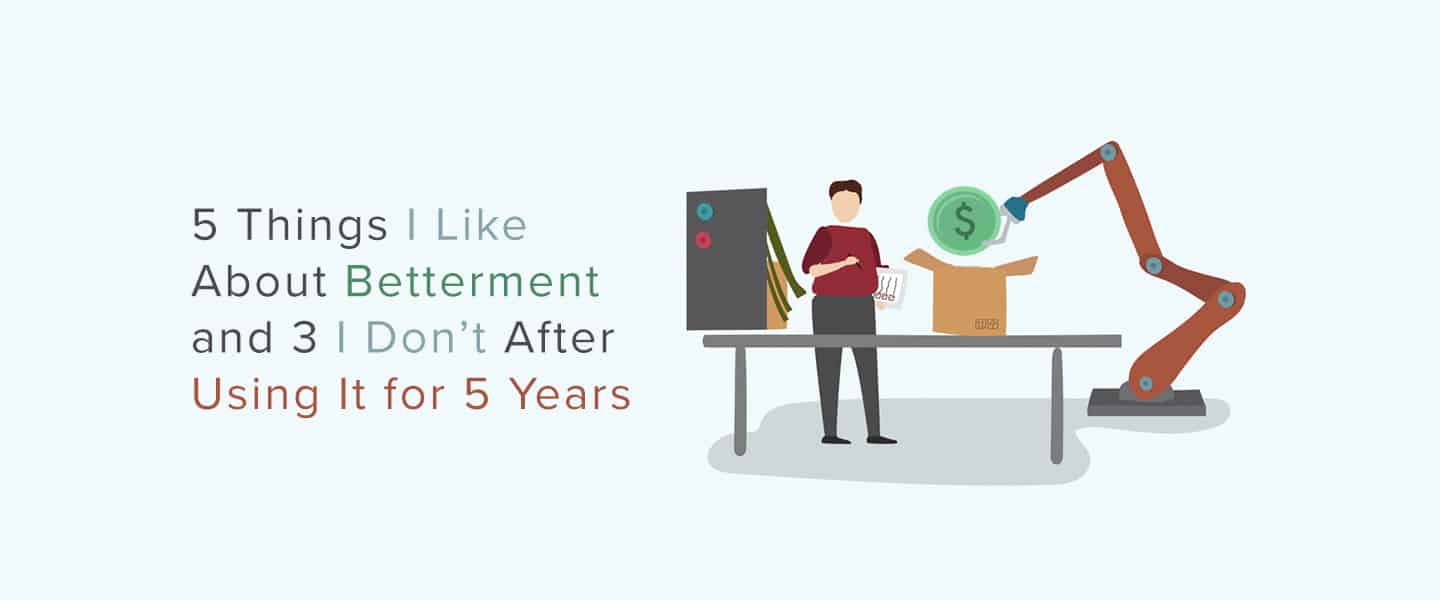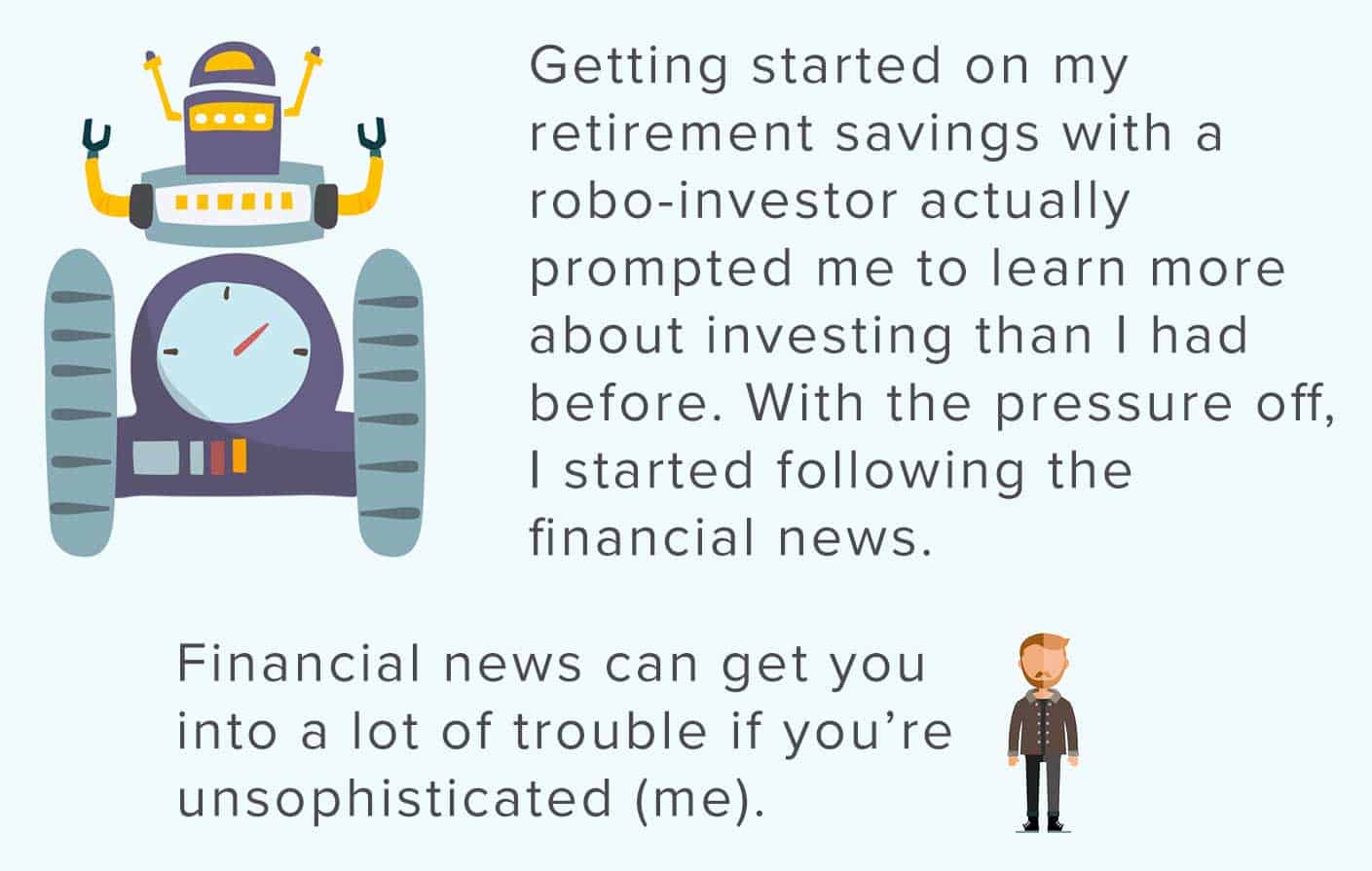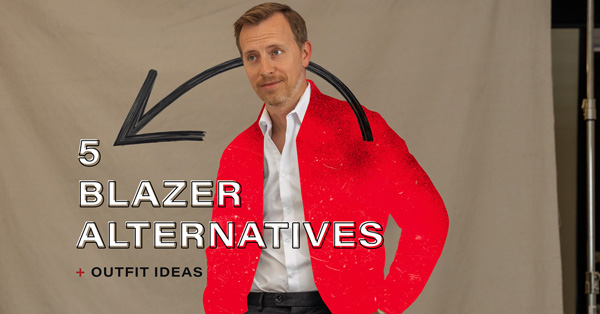When I hit 29 I had a panic moment: what am I doing about retirement?
You’re probably familiar with some version of this feeling. We’re constantly told we should be saving for retirement. What’s less common is hearing how you should do it.
As a freelancer I didn’t have a company-matched 401(k) – never mind that mythical creature known as a “pension.”
So I started reading up about investing: mutual funds, ETFs, loads, expense ratios, strategies, equities vs. bonds, developing markets… it’s a lot to make sense of, and each investment company and financial manager claims to have the secret to amazing returns.
Read more: Primer’s Intro to Investing series
The problem was, I didn’t have ANY way to evaluate what was actually the “best” option for investing my money. I felt behind and overwhelmed by the sheer number of options offered by the financial services industry.
What I wanted was simple:
- Do what I’m supposed to do and save for retirement
- Not feel like I was getting ripped off by high fees hidden behind marketing jargon
- Invest without becoming a part-time expert on it
It’s around this time that Betterment started blitzing my podcasts with ads. I visited the site, did a little homework, and signed up. This post is what I like about Betterment and what I don’t after nearly 5 years of using it.
This post isn’t an endorsement of Betterment over other robo-investors. It’s an honest account of my experience with Betterment and an overall plug for robo-investors in general.
What Is Betterment?
Betterment is what’s known as a robo-investor because the company uses computer algorithms to choose investments, balance your portfolio, and generally do the work that human fund managers used to do. There are still smart humans involved in making decisions, but the day-to-day upkeep is computerized.
As a result, Betterment can offer investment services at a much lower cost than traditional humanoid investment managers, funds, etc.
The other thing to know about Betterment is that it’s a passive investment. What does that mean? In active investing, the investor (or fund manager or whoever) is trying to actively beat the market by picking stocks and making decisions. In passive investing, you simply own a big, representative slice of the market. As the market rises (and falls) so goes your investments.
The general consensus is that while active investing can produce spectacular results sometimes, passive investing consistently outperforms active investing most of the time.
What Kind Of Investor Am I?
Unsophisticated.
I contribute to my IRA every year to get the tax benefit. If I don’t accomplish that goal – hey, I tried. If I do, my future self thanks me because I’m saving for my old age. My present self thanks me because I have a bigger tax refund right now (that I really should reinvest… and sometimes I do!).
If you enjoy doing research on investments or already understand what an “inverted yield curve” is, this is too simple for you.
If you’re like me and want a simple, set-it-and-forget-it way to start saving your pennies for someday… read on.
The Pros: What’s Good About Betterment
1. I’m Saving For Retirement Without Having To Think About It
As with most things, getting started is the hardest part. With investing, getting started can be even harder because it’s so complex and clouded by questions of timing (“Should I invest now? Or wait until the next recession?” “Can I afford to invest?” “What if crypto really IS the future?” (It’s not. Yet.)).
Using a robo-investor like Betterment lowers the bar for getting started. How? Financially, I know it’s a sound way to invest because Betterment’s portfolio is diversified and made up of cheap funds that track the global financial system overall (remember: passive performs!).
Another thing I don’t have to think about: Robo-investors like Betterment automatically reinvest your returns, removing the temptation to spend them and miss out on the earning power of your money as it grows.
Emotionally, I feel good about being able to afford investing because Betterment doesn’t have account minimums or minimum required deposits. Some robo-investors require starting balances of $5000+, a deal-breaker for me. Others require minimum deposits of $100, also too high for my weekly budget.
I’ve set Betterment up to auto-deposit a small weekly amount from my checking account. At the end of the year, I’ve made a significant investment in my IRA. Retirement investing: done.
Remember my three criteria for lazy, just-tick-the-box investing? #1 and #3 are now complete.
- Do what I’m supposed to do and save for retirement
- Not feel like I was getting ripped off by financial industry marketing noise
- Invest without becoming a part-time expert on it
Let’s talk about #2: the cost of investing.
2. I Know I’m Getting A Good Deal
The typical actively-managed mutual fund will cost you .5% – 2% of the value of your portfolio in management fees, with most taking at least 1%. This can seriously eat into your returns over time.
Betterment and competitors like Wealthfront, SoFi, and others charge .25%. Shop around and you can probably get your portfolio managed for free with promotions.
Low fees, along with no minimum account balance, means I know I’m getting one of the best deals when it comes to investing – and that feels good.
3. Pro Features Included
Betterment includes pro features like Tax Loss Harvesting (a concept so aggressively boring I’ll let them explain it), tax coordination across investments, and a bond-only account that’s meant to function like a high-yield checking account that earns a 2.23% annual return.
I’d invest with Betterment (or another robo-investor) even if they didn’t help me keep my tax bill down with their computer black magic, but it’s nice to know I’m getting features that were previously the domain of the wealthy.
4. Your Investments Are Structured Around “Goals”
When you sign up, Betterment prompts you through a short questionnaire and structures your investments around “Goals,” like Retirement and Rainy Day Fund. Part of the questionnaire asks you when you intend to retire and how much money you’d like to have, and it tells you how much you need to be investing every month to reach that goal (based on historical stock market returns).
Whenever I log in, a little red message reminds me, “You have a less than 60% chance of reaching your Retirement Goal.” It’s a clever little piece of behavioral economics that – more often than not – prompts me to kick in an extra few bucks.
5. It’s Easy to Use
The user interface is simple and straightforward. Making deposits or setting up a recurring deposit is simple and straightforward. Betterment’s year-end tax documents are … you guessed it, simple and straightforward.
Cons: What I Don’t Like About Betterment
1. You Can’t Take Advantage Of Market Swings
Getting started on my retirement savings with a robo-investor actually prompted me to learn more about investing than I had before. With the pressure off, I started following the financial news.
Financial news can get you into a lot of trouble if you’re unsophisticated (me).
I started trying to time the market by making small deposits to Betterment when the market was down. The problem was, Betterment doesn’t execute trades right away – or even the same day. I was pissed and shot off a spicy email to customer service.
Their reply? Betterment doesn’t execute trades quickly for two reasons.
First, they batch customer orders to sell or buy stocks and bonds and make them during low trading times to save money on trading fees, which are higher when there’s a buying or selling frenzy. Betterment has to keep their trading costs low so they can pass those savings on to you, the customer, in the form of zero fees to buy or sell assets.
Second, slowness is built into the system to discourage exactly the kind of emotional, market-timing moves that can kill your long term returns. Betterment isn’t set up to actively trade stocks, ETFs, bonds, or anything else, so don’t even try.
Basically, Betterment is there to save you from yourself if you either panic or decide to go on a buying spree.
2. Customer Service Can Be Spotty
About 50% of my emails to Betterment have been answered. If I follow up, they’ll usually get back to me. Since my emails have been whining about when trades were executed, I don’t consider their customer service to be particularly negligent, but it’s worth noting.
3. Betterment Misses “Hot” Investment Opportunities
Investments like real estate have held out the promise of double-digit returns in recent years, as have individual stocks like Netflix. I’ve been tempted, especially as I hear stories of friends who’ve made serious money on such ventures.
Betterment, however, doesn’t allow you to take advantage of such pro-level investment opportunities – that’s simply not what it’s for.
I think of Betterment as an investment tortoise, and use it accordingly. The money I’ve put in Betterment shouldn’t (knock on wood) be touched for 30 years. I’m looking for that 6-ish percent a year that we’ve come to expect from the global financial system, and looking to get it cheaply and simply.
If you’re looking for “hot” investments, good for you! When you succeed, I’ll be jealous. When your investment blows up, I’ll gloat and stick with safe, boring Betterment.
I Like 5 Things About Betterment; I Dislike 3 Things
This ratio says it all: for the right kind of beginning investor, Betterment and other robo-investors are a pretty unbeatable solution to doing what you’re supposed to do: save for retirement.

















